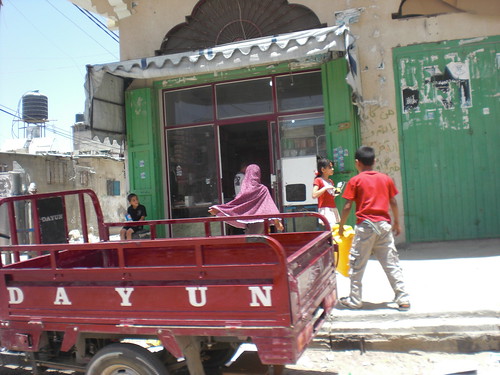The bombardment of Gaza is now constant. My nine-year-old asked me if he would go to heaven or hell
Gaza #Gaza

Here in Gaza, what is happening under Israeli military bombardment has never been seen before. Homes are being destroyed without residents being warned. Israeli missiles are hitting high-rise buildings, mosques, streets – and we are asking ourselves “What’s still to come?” It’s a question we fear to answer.
At Medical Aid for Palestinians, we have released all our pre-positioned stocks of medical supplies to hospitals, as health services have been overwhelmed by the huge influx of injuries. On Saturday, I was going home from a visit to one of our warehouses after having distributed emergency supplies. Suddenly, the sky flashed orange, and there was a massive explosion. I saw people running, leaping for cover, covering their heads, as the airstrike hit. A house had been bombed – one that had been rebuilt after having been destroyed during Israel’s military offensive in 2021.
Israel’s attacks are constant, and they intensify at night. The impact on Gaza’s million children – almost half the population – is severe. My kids run towards their mum and me when an airstrike happens nearby. I hope that these scars will heal after this is over, but deep down I know it is unlikely.
As of Monday, Israel has imposed a “total closure” on Gaza – effectively a siege, restricting the entry of fuel, electricity, and even food and water – despite its obligations under international law. We are suffering with almost no electricity, and it will only get worse. We had no electricity from 3pm on Sunday until 9am on Monday.
Local health services, meanwhile, are completely overwhelmed. For more than 16 years, Gaza has been suffering from a closure and blockade repeatedly condemned as an illegal form of collective punishment. As the blockade has relentlessly continued, our capacities have been weakened. Even before this escalation, Gaza’s beleaguered health system was struggling to cope, with 48% of essential medicines and 26% of medical disposables either completely unavailable or in critically short supply. Now things are even worse, and worse than during any other previous Israeli assault.
One healthcare worker described to me the situation at Gaza’s largest emergency department as a “slaughterhouse”, with bodies on the floor and no space to deal with the massive number of injuries. Health facilities and ambulances have been hit. Six health workers have already lost their lives. Local health officials have called for blood donations amid the relentless number of injured. People are barely coping, and I cannot stop wondering how they can have the mental strength to continue.
Meanwhile, the Israeli bombardment has meant that there are more than 260,000 internally displaced persons who have had to flee their homes. These people need shelter, food, health, psychosocial services, water – the list goes on. We are doing all we can to ensure that they have some basic needs and dignity while displaced, distributing blankets, mattresses, and hygiene kits. But the needs are overwhelming.
We in the health sector are realising the true horror of what is happening here – that no one is safe. Not families in their homes, and not first responders in ambulances. My eldest son, who is nine years old, asked me whether if he died he would go to heaven or hell. This broke my heart in half.
Most of the time now the streets are empty. People fear the worst is yet to come, given the support Israel is receiving from its western allies, without consideration or concern for basic humanitarian principles or international law. We only hope that we will come out of this alive.